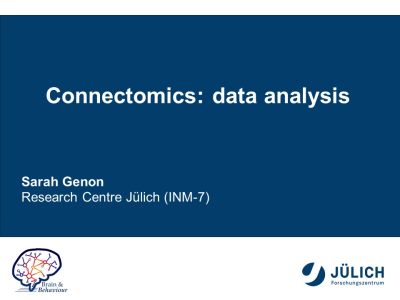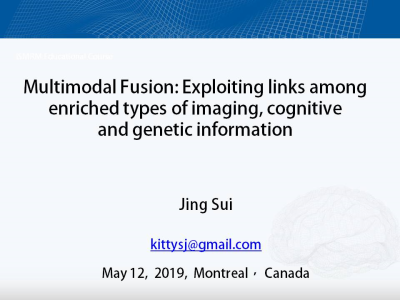Brain Connectivity: Structure & Function
Brain Connectivity: Structure & Function
Weekend Course
Weekend Course
ORGANIZERS: Fernando Calamante, Jongho Lee
Sunday, 12 May 2019
| Room 710A | 13:30 - 16:30 | Moderators: Masaki Fukunaga, Patricia Figueiredo |
Skill Level: Intermediate
Session Number: WE-24
Overview
In this session, functional and structural brain connectivity (measured by resting state fMRI and diffusion MRI, respectively) will be introduced, and the link between these two connectivity types will be discussed.
Target Audience
This course is designed for basic scientists, clinicians and technologists, who would like to learn about functional and structural connectivity of the brain.
Educational Objectives
As a result of attending this course, participants should be able to:
- Describe basic concepts of structural and functional connectivity in MRI;
- Explain data processing steps for connectomics measurements; and
- Recognize the link between structure and functional connections in the brain.
Overview
In this session, functional and structural brain connectivity (measured by resting state fMRI and diffusion MRI, respectively) will be introduced, and the link between these two connectivity types will be discussed.
Target Audience
This course is designed for basic scientists, clinicians and technologists, who would like to learn about functional and structural connectivity of the brain.
Educational Objectives
As a result of attending this course, participants should be able to:
- Describe basic concepts of structural and functional connectivity in MRI;
- Explain data processing steps for connectomics measurements; and
- Recognize the link between structure and functional connections in the brain.
| 13:30 |
How the Brain Is Connected
David Van Essen
Recent studies of long-distance connections in the cerebral cortex reveal that they are remarkably complex, but major insights have been learned using anatomical tracers in monkeys and mice and noninvasive neuroimaging in humans and monkeys.
|
|
| 13:55 |
Introduction to Functional Connectivity
Zhongming Liu
This talk will serve as an introduction to functional connectivity. The primary focus is on spontaneous brain activity observed with functional magnetic resonance imaging. In this talk, I will cover the origins of resting state fMRI signals, analysis methods to map large-scale functional brain networks based on fMRI (or MEG/EEG), dynamics of functional connectivity, variation of functional connectivity across brain states, diseases, or individuals, as well as some recent work of using deep learning to map or analyze functional connectivity.
|
|
| 14:20 |
Introduction to Structural Connectivity
Maxime Descoteaux
Introductory course for people seeking to learn about the fundamental of structural connectivity and building the “connectome” using diffusion MRI tractography.
|
|
| 14:45 |
Break & Meet the Teachers | |
| 15:15 |
 |
Connectomics: Data Analysis
Sarah Genon
Connectomics analyses play a major role in our understanding of the human brain organization and function. In this talk, I will present the concepts, methods
|
| 15:40 |
Linking Structural & Functional Connectivity: Methods & Modeling
Richard Betzel
The human brain can be modeled as a set of white-matter fibers (structural connectivity; SC) that constrain inter-regional interactions and shape the correlation structure of brain activity (functional connectivity; FC). Though SC and FC capture distinct connectional modes, they can both be modeled as networks. Understanding their relationship to one another is critical for if we wish to deepen our knowledge of the role networks place in cognition, health, and development. In this talk I will review current approaches for linking SC with FC, emphasizing that there exists a spectrum of approaches, each suited for answering specific research questions.
|
|
| 16:05 |
 |
Multimodal Fusion: Exploiting links among enriched types of imaging, cognitive and behavioral information Video Permission Withheld
Jing Sui
Psychiatric imaging is struggling with identifying robust biomarkers. Existing approaches do not fully leverage the power of multimodal data, despite evidence that such information is highly informative. We will draw on advances and ideas from fields of supervised learning,data fusion and deep learning, to capture rich information from imaging, cognitive, behavioral and genetic data, in order to integrate a whole picture to deepen our understanding of neural mechanism of cognitive impairment, and to identify replicable biomarkers that are able to predict individual clinical measures and help for differential diagnosis and intervention.
|
| 16:30 |
Adjournment & Meet the Teachers |
 Back to Program-at-a-Glance |
Back to Program-at-a-Glance |  Back to Top
Back to Top